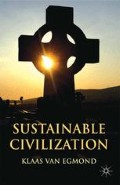Abstract
’sustainability’, as indicated in Chapter 1, in the first place depends on people’s value orientations and, secondly, on the carrying capacity of the physical, social and economic environment in which these values are to be realized. At the same time, however, this carrying capacity of the social and economic environment, in turn, largely depends on these very value orientations. Given the apparently important role of value orientations, the search for sustainability has to begin with finding the answers to questions that are related to people’s opinions and values, and thus the ‘worldviews’ they hold. Worldviews not only vary between people but also over time; they represent a particular Zeitgeist. An analysis of the various worldviews and how they change over time could provide a picture of the causes of recurring sustainability problems. As these causes become visible, so will their solutions.
Access this chapter
Tax calculation will be finalised at checkout
Purchases are for personal use only
Preview
Unable to display preview. Download preview PDF.
Notes
M. E. Koltko-Riviera (2004). ‘The Psychology of Worldviews’, Review of General Psychology, Vol. 8, No. 1, pp. 3–58.
M. Rokeach (1973). The Nature of Human Values. Free Press, New York.
M. Rokeach (1973). The Nature of Human Values. Free Press, New York. NIPO report A9061, 2002.
C. G. Jung (1960). The Nature of the Psyche. Princeton University Press, Princeton.
B. Russell (1946). History of Western Philosophy. George Allen & Unwin Ltd., London.
E. Fromm (1976). To Have or to Be. Harper & Row, New York.
P. Sorokin (1957). Social and Cultural Dynamics. Transaction Publishers, New Brunswick.
I. Kant (1788). Critique of Practical Reason (Kritik der Praktischen Vernunft) Cambridge University Press, Cambridge.
E. Levinas (1961). Totalité et Infini. Essai sur l’extériorité (Martinus Nijhoff Publishers, The Hague).
G. W. F. Hegel (1821–31). Lectures on the Philosophy of History (Vorlesungen über die Philosophie der Geschichte). Philipp Reclam Jun.; Stuttgart.
C. Taylor (1979). Hegel and Modern Society. Cambridge University Press, Cambridge.
R. Steiner (1894/1995). The Philosophy of Freedom (Die Philosophie der Freiheit), Rudolf Steiner Verlag GA4, Schweiz.
R. Steiner (1914). Human and Cosmic Thought CW 151. Rudolf Steiner Press, Dornach, Switzerland.
J. Sijmons (2008). Phänomenologie und Idealismus. Analyse der Struktur und Methode der Philosophie Rudolf Steiners. Schwabe AG Verlag, Basel.
R. Steiner (1918). The Fundamental Social Demand of our Times (Die soziale Grundforderung unserer Zeit) (GA 186). Rudolf Steiner Verlag, Dornach.
K. Wilber (1995). Sex, Ecology, Spirituality. The Spirit of Evolution. Shambhala Publications, Boston.
C. G. Jung (1960). The Nature of the Psyche. Princeton University Press, Princeton.
M. L. von Franz (1985). Der Traum des Descartes. In Tra�FC;xme. Daimon Verlag, Zurich, pp. 171–72.
C. G. Jung (1905–61). Psychological Reflections. An Anthology of Jung’s Writings 1905–1961. Edited by Jolanda Jacobi. Routledge. In Jung Collective Works; On the Nature of Dreams; CW8-557. Patmos Verlag, Ostfildern, Germany.
Van Erkelens (2002). Wolfgang Pauli und der Geist der Materie. Verlag Köningshausen & Neumann GmbH, Würzburg. H.
Van Erkelens (1995). The Game of Wisdom. Pauli, Jung and the Humanization of God’ (Het spel der wijsheid. Pauli, Jung en de menswording van God), Kok Agora, Kampen.
C. Taylor (1979). Hegel and Modern Society. Cambridge University Press, Cambridge, UK.
G. W. F. Hegel (1821–31). Lectures on the Philosophy of History (Vorlesungen über die Philosophie der Geschichte). Philipp Reclam Jun.; Stuttgart.
S. Schwartz (1999). ‘A theory of cultural values and some applications for work’. In Applied Psychology: An International Review. Vol. 48, No. 1, pp. 23–47.
The IPCC scenarios describe the alternative socioeconomic developments of the twenty first century, in order to estimate C02 emission levels. The worldviews that form the basis for the IPCC scenarios deviate to a certain level from the worldviews derived from the surveys. The IPCC scenarios assume the contrast of’ socio-ecological quality of life’ versus ‘material prosperity’, whereas here the contrast is formed by the idealist (spiritual, non-material) versus the materialist. The horizontal axis in the IPCC studies is briefly explained as globalization versus regionalization (protectionism), as the differentiation of the more general contrast between uniformity and diversity, and the corresponding fundamental contrast between whole and part, sometimes interpreted as collective versus individualist. H. J. M. de Vries, J. Bollen, L. Bouwman, M. den Elzen, M. Janssen and E. Kreileman (2000). ‘Greenhouse gas emissions in an equity-, environment — and service-oriented world. IMAGE-based scenarios for the 21st century’, Technological Forecasting and Social Change. Vol. 63, pp. 137–74.
H.J. M. de Vries (2007). ‘Scenarios; guidance for an uncertain and complex world?’ In Constanza, Graumlich and Steffen (eds) Sustainability or Collapse? MIT Press, London.
P. Singer (1983). Hegel. Oxford University Press, Oxford.
P. Sorokin (1957). Social and Cultural Dynamics, Transaction Publishers, London.
E. F. Schumacher (1973). Small Is Beautiful. Harper & Row, New York.
S. Huntington (1997). The Clash of Civilizations. Simon & Schuster, New York.
S. Hall, D. Held and K. Thompson (1996). Modernity: An Introduction to Modern Societies. MPG Book, Bodmin Cornwall.
R. Steiner (1918). Historical Symptomatology (Geschichtliche Symptomatologie), (GA 185) Rudolf Steiner Verlag, Dornach.
R. Bultman (1987). Interpreting Faith for the Modern Era. In Roger Johnson (ed.) Fortress Press, Minneapolis.
R. Dawkins (2006). The God Delusion. Transworld Publishers, London.
Author information
Authors and Affiliations
Copyright information
© 2014 Klaas van Egmond
About this chapter
Cite this chapter
van Egmond, K. (2014). Human Value Orientations: Worldviews. In: Sustainable Civilization. Palgrave Macmillan, London. https://doi.org/10.1057/9781137382702_2
Download citation
DOI: https://doi.org/10.1057/9781137382702_2
Publisher Name: Palgrave Macmillan, London
Print ISBN: 978-1-349-48010-4
Online ISBN: 978-1-137-38270-2
eBook Packages: Palgrave Intern. Relations & Development CollectionPolitical Science and International Studies (R0)

